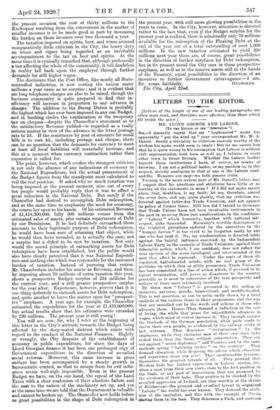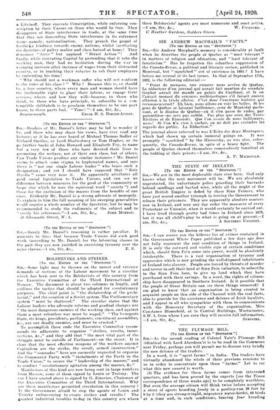LETTERS TO THE EDITOR.
[Letters of the length of one of our leading paragraphs are often more read, and therefore more effective, than those which fill treble the space.] MR. LLOYD GEORGE AND LABOUR.
ITO THE EDITOR or TER " SPECTITOR."J Sin,—I sincerely regret that my " hyphenated" name has apparently " put the wind up " your correspondent Mr. W. A. Daniel. Surely a triviality in criticism scarcely worthy of the wisdom his name would seem to imply! But let me assure him that he is quite wrong in his assumption that Labour is without club representation both here as well as, I believe, in every other town in Great Britain. Whether the Labour leaders boycott these institutions I have, of course, no means of knowing. I am not a political leader, so my position is, in this respect, strictly analogous to that of one of the Labour rank- and-file. Honours are easy—we both possess clubs.
Turning to the more serious part of Mr. Daniel's letter, may I suggest that his questions and strictures have little or no bearing on the statements in mine ? If I did not make myself plain, that, doubtless, is my fault; let me, therefore, amend the error here, and say, quite plainly, that my criticism was directed against latter-day Trade Unionism, and not against its policy of former times. Still less did I intend to insinuate that Trade Unions have not been invaluable instruments in the past in securing those just ameliorations in the conditions of "Labour " which humanity, together with national self- respect, alike demanded. Macaulay's terrible description of the frightful privations endured by the operatives in the "hungry forties" is too vivid to be forgotten easily by any one who has read it. No; my condemnation is directed solely against the baleful influence exercised by the Independent Labour Party in the councils of Trade Unionism; against their detestable policy, which, I am confident, does not reflect the true opinion of the more intelligent and sober-minded of the men they affect to represent. Under the aegis of these ill- regulated, half-educated. minds, with no real grasp of the problems on which they so glibly pronounce, Trade Unionism has been committed to a line of action which, if pursued to its logical termination, will prove as disastrous to the country generally as it must he subversive of the true prosperity and welfare of those most intimately involved.
By these men " Labour " is presented to the nation as insincere, perverse, greedy, hypocritical, and muddle-headed. This is not assertion, as can be quite easily shown by a brief analysis of the various items in their programme, and the way they are cancelled out by the words and actions of those who advocate them. Hence—They demand a reduction in the cost of living, the while they press for unjustifiable advances in wages, which must of course increase it. They inveigh against the blockade of the German population, while quite ready to starve their own people, as evidenced by the railway strike of last autumn. They denounce " victimization " by the employers, while they victimize men of their own class (who risked their lives for them) without compunction. They cry out against " secret diplomacy " and Treaties, and by the same methods spring "lightning strikes" on the country! They
demand education, while despising the advice which education and experience alone can give! They anathematize tyranny, themselves the greatest tyrants of all. They pretend that Wisdom finds her highest expression in Labour circles, yet, when a man from their own ranks rises to the first position in the State, or any post of importance, they are possessed by the virulence of their hate. They profess to be shocked by the so-called oppression of Ireland, yet they worship at the shrine of Bolshevism—the grossest and cruellest tyrant to organized "Labour " the world has ever known. They demand the aboli- tion of the capitalist, and this with the example of Hursia staring them in the face. They denounce a. Foch, and embrace a Litvinoff. They execrate Conscription, while enforcing con- scription by their Unions on those who would be free. 'They disapprove of State interference in trade, at the same time that they are demanding State interference in its extremest
form—namely, nationalization. They preach the gospel of brothei,y kindness towards enemy nations, whilst iliculcating the doctrines of paltry malice and class hatred at home! They denounce " force" but applaud " Direct Action "! And finally, while execrating Capital by pretending that it robs the -working man, they had no hesitation during the war in wringing increase after increase of wages from their distracted country, or in teaching their votaries to rob their employers by embezzling his time!
" Why should not a workman suffer who will not c.mform 10 the rules of his class ? " Why ? Because this is, or should lie, a free country, where every man and woman should have the inalienable right to place their labour, or engage their services, where and how they will—because, to those who think, to those who have principle, to subscribe to a con- temptible shibboleth is to proclaim themselves to be one part knave, to three parts fool. "Time! "—I am, Sir, &c.,



































 Previous page
Previous page